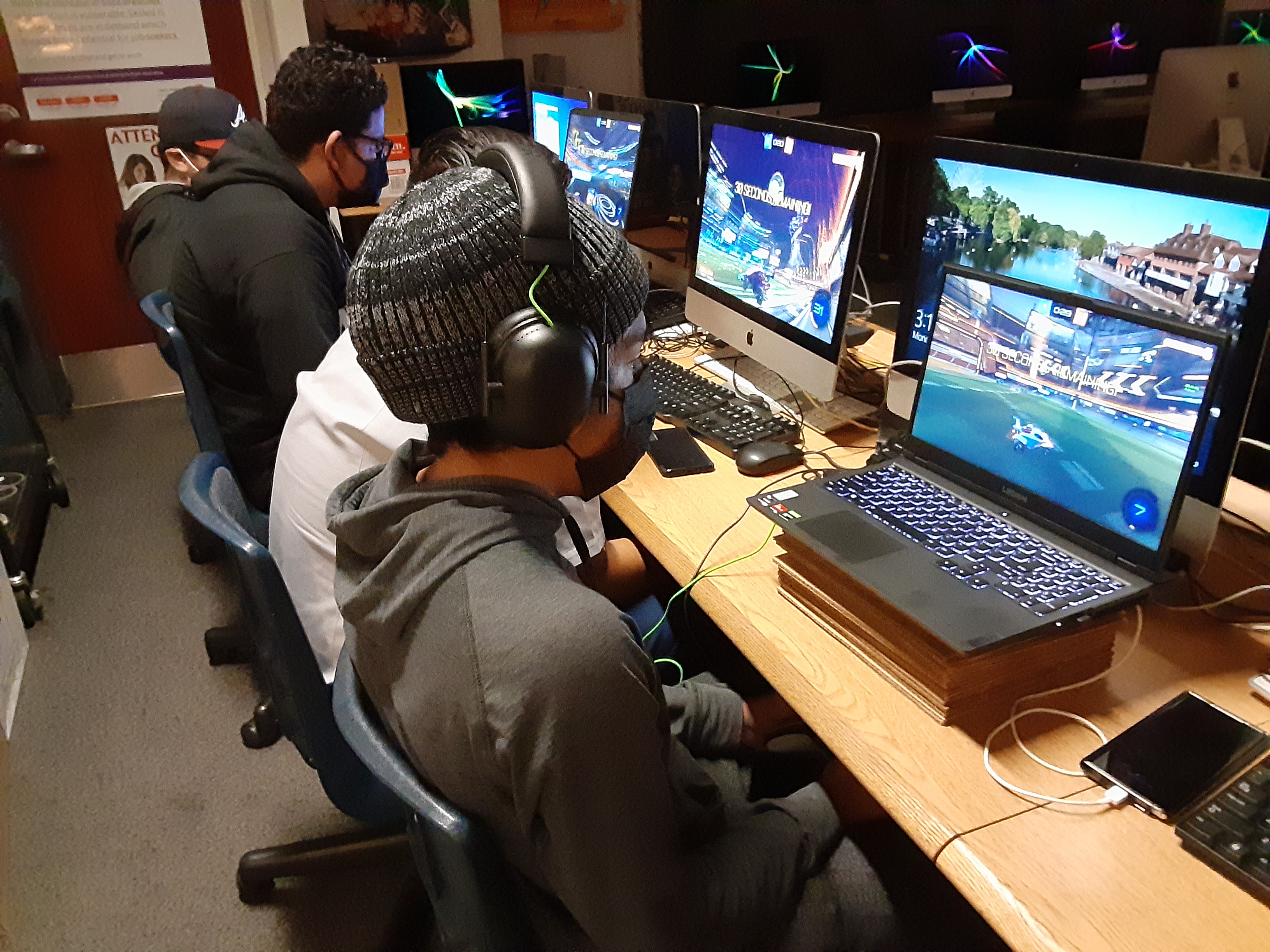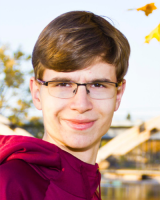As high school esports grows in Arizona, Carl Hayden continues to evolve in a new era of extracurriculars
December 8, 2021 by Jesse Brawders, Arizona State University

Jesse Brawders is an ASU Cronkite School of Journalism student assigned to cover Carl Hayden Community High School for AZPreps365.com.
In high school, kids make memories that last a lifetime. In the classroom, in the theater or on the football field, students have the opportunity to build skills and memories they can take with them for the rest of their lives.
Over the last five years or so, they have found another way to connect with students from their high school and beyond through esports.
Carl Hayden Community High School jumped on this trend back in the spring of 2019, when they joined the new statewide esports league — but this wasn’t the school’s first time playing in esports.
The school has had an esports team in the past, fielding a team in the now-disbanded High School StarLeague in the years leading up to their arrival in the new statewide league. The school was only able to field a team for Riot Games’ “League of Legends” and found very little success playing against teams from schools all over the West Coast.
The students in the school’s magnet program started hearing rumors about an official esports club in the beginning of the 2018-19 school year. During the spring semester of that school year, the Carl Hayden Falcon Esports club was created.
The esports industry has boomed over the last decade, with franchises like “League of Legends,” Valve Corporation’s “Counter-Strike: Global Offensive,” Psyonix’s “Rocket League” and many more holding leagues and tournaments across the world.
Even during the COVID-19 pandemic, esports market revenue held strong and even increased this year. According to an August 2021 study done by Christina Gough, a gaming and esports research expert for Statista.com, global esports market revenue slid from $957.5 million in 2019, to $947.1 million in 2020. This year, revenue has shot up to $1.084 billion, an increase of roughly $137 million. The esports market revenue is expected to hit $1.6 billion by 2024.
A large part of this was the return of in-person events for the top leagues across multiple games. Game titles including Valve Corporation’s “DOTA 2,” “League of Legends” and Riot Games’ “Valorant,” all returned to live events at set venues, instead of all of the teams competing from their homes or facilities.
The Arizona Interscholastic Association (AIA) has been partnered with PlayVS, a company that helps run and regulate high school esports leagues and tournaments, since spring of 2019, and has helped organize the league for the past five seasons. This is the platform that Carl Hayden Falcon Esports plays throughout their seasons.
AIA currently offers leagues in “League of Legends,” “Rocket League,” Nintendo’s “Super Smash Bros. Ultimate” (SSBU) and “Splatoon 2,” Electronic Arts’ “FIFA 21” and “Madden 21,” as well as Hi Rez Studios’ “Smite.” Carl Hayden currently participates in “League of Legends,” “SSBU” and “Rocket League.”
Carl Hayden Falcon Esports coach Michael Marmolejo has been at the head of the school’s esports program since their time in the High School StarLeague. When Carl Hayden joined the AIA sanctioned league, Marmolejo became a co-chair of the AIA Esports Advisory Committee, which oversees the league’s operations and coordinates with the AIA and PlayVs.
Marmolejo has been around gaming and esports culture for decades, including owning every single Nintendo console ever made, and has bridged the gap between learning and playing. He is in his 14th year teaching at Carl Hayden, where he teaches graphic design, cybersecurity, networking and operating systems, and now esports.
Carl Hayden, as well as high schools from across the state, had to adjust to the pandemic in a very similar fashion to the professional esports teams. When classes were pushed to online in the spring of 2020, not every student had access to a computer, and the season for the Falcons and other Arizona teams was canceled.
The following season, Carl Hayden was still having online classes only, but loaned out computers to those who did not have access. This allowed the school to resume their involvement in the AIA league, and kept a connection to fellow students who were going through the same struggles.
Part of what makes esports so inclusive is that shifting to a fully online format is not too different from what the students do at home almost every day, which is play their favorite game(s) online against people from across the country and sometimes the world.
PlayVS Customer Experience League Official Taylor House described what he sees as the primary benefit of high school esports: creating a community for students who wouldn’t normally get involved in traditional extracurricular activities.
“I think the largest benefit of high school esports is the unique group of high school students it brings that typically don't get involved in extracurricular activities with other students, which in turn helps foster a sense of community and camaraderie among the students,” House said.
“I think exposure to the esports space this early really gives kids the opportunity to investigate esports and figure out if there are opportunities for them to develop themselves as leaders or team players and hopefully for some spark an interest in making a career out of gaming while not necessarily as ‘pro’ gamers,” House added.
Carl Hayden senior Isaac Rodriguez expressed his reasons for joining the esports program, sharing that it has introduced him to students with similar interests.
“The reason I joined is at the time I was playing ‘[Super] Smash Bros.’ a lot, and I really didn’t have anyone to play it with, so I was just playing it online,” Rodriguez said.
Rodriguez has played “League of Legends” and “SSBU” for the Falcons, with his main interest in playing for the “Super Smash Bros. Ultimate” team.
Schools are starting to embrace these benefits, but Carl Hayden stands out for one key factor: esports is a class for actual credit.
Marmolejo converted the esports club to an after-hours class that counts toward a student’s credits. This gives the students an outlet, but it also makes them focus on their grades if they want to play, due to Marmolejo’s “no pass, no play” rule. If a student has a failing grade in any class, they cannot play for the Falcons until they raise their grade.
“It gives them a reason to come to school, you know, and not just a reason to come to school, but a reason to come to school and be serious with their grades,” Marmolejo said.
With Marmolejo’s motto of “gameplay with a purpose,” the program looks to improve the students’ outlook on school. Some students have embraced it, but the program has also lost students due to failing grades or losing the desire to play esports competitively.
It also has created a divide with some parents, who do not agree with their kids staying after school multiple times a week playing video games. Marmolejo sees esports like any other sport a student can play in during their time at Carl Hayden, with students needing to stay a couple hours after school for games and practices with their teammates.
These parents are representative of a broader group who are just learning what esports is, and how it is different from playing video games casually. This process has been expedited due to the COVID-19 pandemic, where a mixture of students playing video games at home during lockdown and professional esports leagues still competing from home allowed for more eyes on the esports and gaming industries than ever before.
With the return of students in the classrooms of Carl Hayden, it also brought the return of students playing in matches from Marmolejo’s classroom. The positives are the students being able to see and interact with their teammates, but it also has its drawbacks.
Carl Hayden, like many high schools, has a firewall to block any unwanted programs and/or sites from their online networks, including the games the esports class plays in. To get around this issue, Marmolejo and his students connect their laptops to the computers in the room, and run a private network to get through the firewall.
This has obvious issues, including inconsistent connections and a multitude of wires, but it allows them to at least play every week.
Senior Julio Lopez is a starter for the “Rocket League” team, and plays on his laptop, which is lifted up by a cardboard box. He said the wifi issues are not great, but they are still able to play every week and he enjoys being able to play at school with his friends against teams from across the state.
With the rise of collegiate esports over the last five years, more colleges are offering scholarships to students to join their esports teams, offering scholarships to students to join their esports teams, many of which compete as varsity teams under the National Association of Collegiate Esports. This rise has led to more high schools taking esports seriously and broadcasting their students to potential scouts and recruiters.
High school esports across the country is on track to continue increasing in popularity in the near future, and Carl Hayden Falcon Esports will be ready for whatever comes next.
